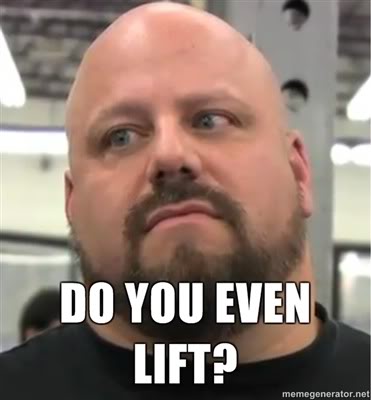 There are heaps of new trainees and lifters joining the “online strength training communities” — it’s fantastic. However, there are some terms that are thrown around that are often misguided, confuzzled, or plain wrong, so let’s clarify them.
There are heaps of new trainees and lifters joining the “online strength training communities” — it’s fantastic. However, there are some terms that are thrown around that are often misguided, confuzzled, or plain wrong, so let’s clarify them.
“I’m doing the powerlifts.”
This is almost always said by someone coming from CrossFit, but I’ve seen it in some general populations as well. Squatting, benching, and deadlifting does not mean that you are powerlifting. This is like saying that tossing a football around is “playing football”. Powerlifting is a specific sport with specific demands and powerlifting, at the very least, requires that you enter a competition. Many athletes will strength train to augment their physical capacity for their sport, but it doesn’t mean they are powerlifting.
Instead, just say that you are “strength training”; it will solidify the distinction. It’s sort of ironic that powerlifting includes the word “power” since there isn’t a lot of power developed (speed is relevant in high power production). I just refer to squatting, pressing, deadlifting and other slow movements as “the strength lifts”. It helps me sleep better.
Let’s be fair to “weightlifting” too.
As an extension, we could say that you aren’t doing “weightlifting” if you’re snatching and clean and jerking. This misnomer isn’t as common (probably because weightlifting isn’t as accessible to the average trainee), but saying “I am doing the Olympic lifts” is more accurate. Oh, and Glenn Pendlay hates when you say “Oly”. It’s a CrossFit thing to use certain lingo, but when it’s incorrect it alienates certain people.
“Should I do Wendler?”
I bet he’d fucking like that a lot, assuming you have the required equipment (a vagina, I’d assume). Jim named the program “5/3/1”, and it’s pretty simple, so let’s just say that. There’s no need to rename stuff, especially because it makes you seem like a hipster. And everyone hates hipsters.
“High hang super power balls snatch”
Everything above is just nitpicking semantics (IT MATTERS, OKAY?), but this is more of helping new people with the definitions. The Olympic lifts have variations, and I will help you know them. In a biblical sense.
If the movement is named by itself (i.e. snatch, clean), then it’s done from the floor to the fully squatted position (i.e. overhead squat or front squat to receive the bar).
If the movement is preceded by “hang”, it’s held in the hands while standing straight up, lowered to ‘second position’ or the thighs, then the lift is completed as normal (fully squatted). The presence, or lack thereof, of “hang” tells you how you start.
If the movement is preceded by “power”, it is not caught in a squat position, but at least above 90 degrees in the knees (i.e. it is caught high in the ‘power position’). The presence, or lack thereof, of “power” tells you how you finish.
If the movement is preceded by “hang power”, then you not only start with the bar (hanging) in your hands, you also finish in the ‘power position’.
There are some other variations, but if you’re having trouble with these, then let’s not worry about those. We don’t like their kind anyway. These variations can be used in weightlifting programs or complicated strength and conditioning programs. I say “complicated” because it’d be easier or more efficient to just say “do power cleans” instead of “hang power boner cleans”. Or something.
